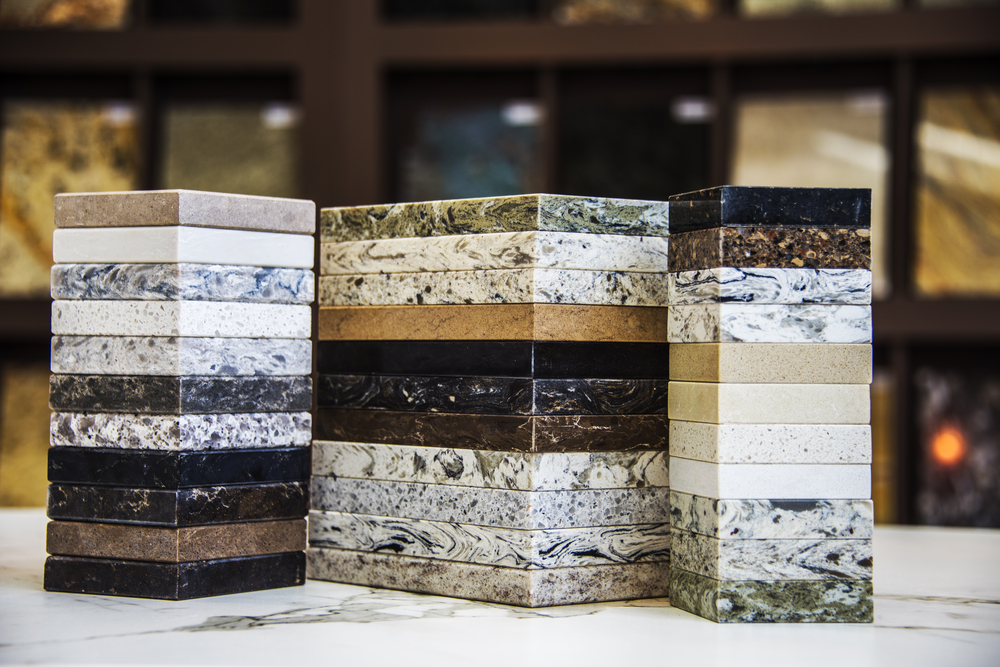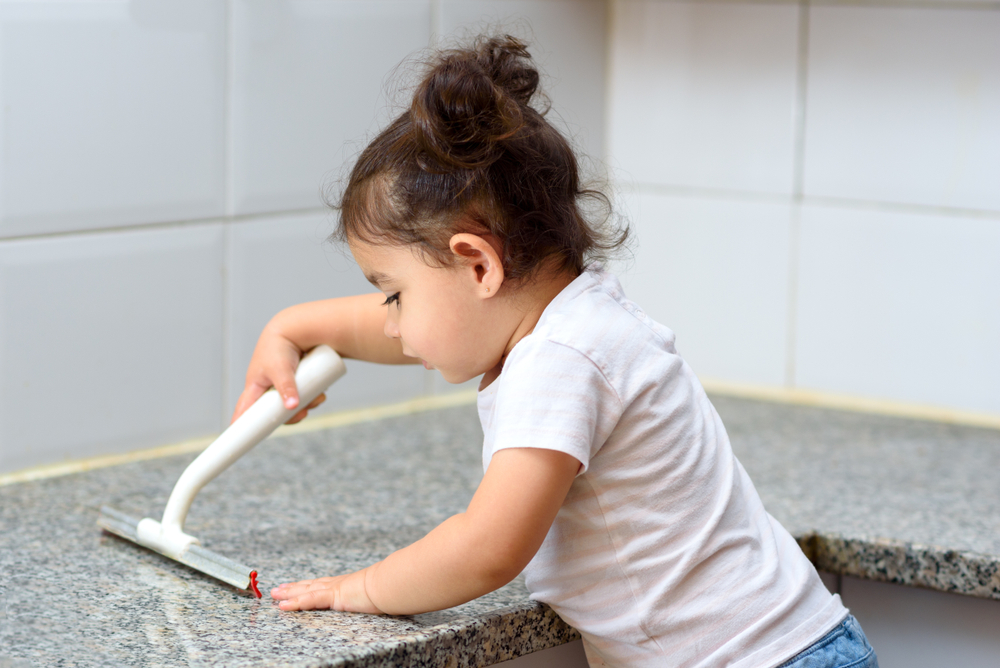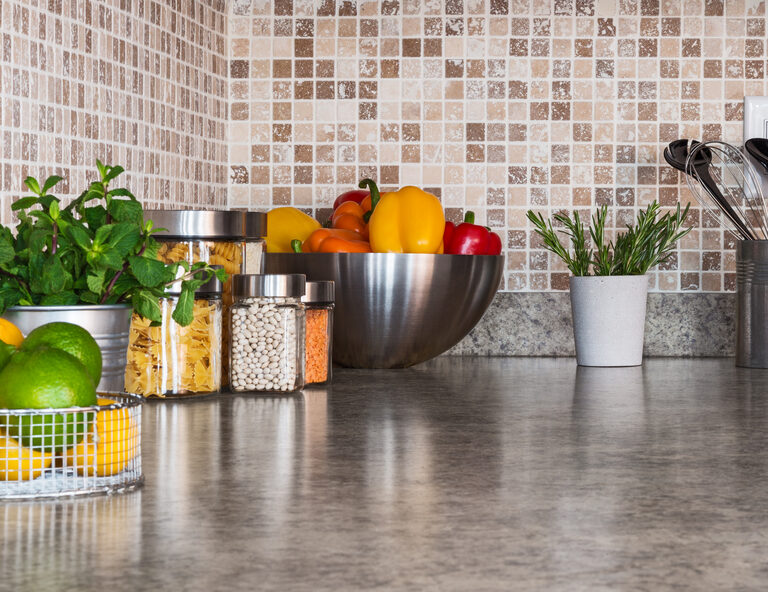Alright, let’s get this out of the way right off the bat: Don’t take them for granite, keep your countertops looking like new with the help of our cleaning guide.
Now that the obligatory granite pun is out of the way, let’s dive into the useful stuff. In this article we’ll cover the best methods, products, and tools for cleaning and maintaining lustrous granite countertops.
Granite Countertop Material Characteristics
First up, some contextual background information from everyone’s favorite middle school class.
Granite Formation
Granite, as we all remember from our 6th-grade geology teachers, is an igneous rock formed from the cooling of superheated magma. The molten magma that will become granite flows into nearby rock and mineral structures, thus creating the arrangement of the final product that results from the slow cooling of the liquid magma encasing other materials inside it.

Various types of minerals can mix into and change the final appearance of granite. This is what gives granite its characteristic appearance with variations in patterns and colors. This process is also why granite is such a hard, dense, and heat-resistant material—making it excellent for kitchen countertops.
Granite Appearance
Naturally, granite is a very coarse and porous material. This would normally make the material a poor one for kitchen counters as food and bacteria would sink down into the pores, becoming a disgusting health hazard. Granite countertops, however, are machine cut, sanded, and polished to provide an almost completely smooth surface. The granite countertop is then finished off with a coat of impregnating sealant.
This sealant, as the term “impregnating” so aptly implies, is absorbed into the top layer of the granite where the resin clogs the pores. The seal helps further reduce the absorbency of the granite countertop, which protects the counter from easily staining.
Granite Staining
That’s not to say that granite countertops are safe from all types of staining. Some liquids (such as oils) evaporate much too slowly, which allows them to stay on the surface of the granite long enough to soak in and stain the material if not cleaned up. Furthermore, granite and the sealant protecting the granite are vulnerable to non-neutral pH balances.
This means acidic things like vinegar, citrus, and tomatoes as well as basic things (no, not your sister’s friends) such as bleach and ammonia, can cause damage to your countertops and the sealant that protects them. It also means most cleaners, including homemade ones, are a no-go when it comes to cleaning granite counters.
All of this conveniently leads us directly into our next section of the guide—almost like it was on purpose.
How to Clean Granite Countertops
Cleaning granite counters is actually quite straightforward. When it comes to everyday maintenance, warm water mixed with mild dish soap and a rag will do nicely, as long as it’s properly sealed.
Protect the Seal
Performing regular cleaning like this will keep granite countertops clean and shiny for a long time since mild soap has a neutral pH that won’t harm the seal or the stone.
For those who want to ensure the seal on their granite counters is maintained, this Granite Plus! 2 in 1 Cleaner Sealer Sealer is about as easy to use as it gets. Designed for daily use, just spray down the surface and buff it clean with a rag or microfiber cloth. As an added bonus, this spray is pH neutral and environmentally friendly.
Razor Scraping
For stubborn build-up or hardened messes, a razor scraper like this one from Mulwark will do perfectly. Granite is a very hard material that is exceptionally scratch-resistant, which means you can safely use sharp tools like a razor to scrape messes up. Just keep the flat of the blade pressed evenly onto the surface and press the razor down as you push it through the trouble spots.
Regular Wipe Downs
The best way to protect your granite countertops is to ensure that they stay clean and dry at all times. This doesn’t mean you need to break out a spotlight and magnifying glass to clean every millimeter of the counter. Just make sure you wipe up messes as they happen to prevent staining and damage to the material. For the most part, granite countertops are a very forgiving and easy to care for material.

If you want to clean and disinfect your granite countertops at the same time, this Granite Stone Daily Clean Shine spray kills 99.9% of foodborne illness-causing bacteria and germs. Just spray it on the counter, let it sit for 10 minutes to kill off the germs, and then rinse with a wet rag before drying.
These products and methods are great for cleaning granite counters, but what about dealing with stained granite countertops?
Deal With Common Spills
Some common spills that are more likely to cause staining, etching, or damage to granite countertops are soft drinks, tomato sauces, and citrus juices. Acidic food messes should be cleaned up quickly to prevent staining and damage, but they aren’t code red emergencies or anything.
Most lasting damage to a granite countertop will happen slowly over time. But what about dealing with stained granite countertops?
How to Treat Stained Granite Countertops
As we mentioned above, well-sealed granite counters are very resistant to staining, but not immune. And if your seal has degraded over time (or wasn’t properly applied in the first place), staining is even more likely. Oil and grease stains have a high likelihood of occurring at some point—especially if you aren’t thorough and diligent when cleaning around the stove.
The easiest way to deal with set-in stains from oil and grease is with a poultice like this Oil Stain Remover from StoneTech. You apply the ready-to-use paste over the affected area and about 1-2” beyond its edges. Then you allow the paste to absorb the oil out of the stone until it dries into a powder. It should take roughly 48-72 hours to dry completely. At this point, you just scrape off the powder with a scraper like this one.
You can try a similar approach with a home remedy method by mixing together a paste from baking soda combined with water. For this method, you apply the paste in the same way as above by covering the entire area and an added couple of inches worth of space around the stain.
However, unlike with the RTU paste, the homemade baking soda mixture needs to be covered with plastic wrap and taped down to prevent it from drying out too quickly. Poke small holes in the plastic wrap to allow the paste to dry slowly while it absorbs the stain out of your granite counter. After about 48 hours, the paste should be dry and ready to be scraped off.
Either of these methods can be repeated if the stain remains after treatment. But the best way to get rid of stains is to never let them happen in the first place. And that’s where regular maintenance comes in.
How to Maintain Granite Countertops
The seal on your granite is your fiercest ally in the battle against stains. Easy to use and perfect for creating and maintaining a protective seal, this Granite Sealer Protectant Premium Stone Care spray or the 2-in-1 cleaner/sealer we mentioned above are both great products that are safe for everyday use.
Granite is capable of handling extreme heat without any fear of burning, but sudden temperature changes can still cause cracks and damage sealant. Granite is also not immune to impact damage and can be cracked, chipped, or even completely broken by heavy weights being dropped on it or placed on its corners.
This means you really shouldn’t be sitting or climbing on your granite countertops. If you have no other option than to get on top of your granite counters, just try to stay away from overhangs and be careful of the corners of the countertop, which are especially vulnerable to breaks.
Long-Lasting Granite Countertops
Granite is an incredible material that originates from liquid magma flowing beneath the Earth’s surface. When properly maintained, granite countertops can maintain their beautiful, gleaming personality for many years to come.
Regular cleaning with mild soap will do the trick for the most part along with renewing the seal every 1-3 years as needed. Granite holds up well to the various tests of time and only needs a little bit of your help to stay in tip-top shape. Make sure to clean up spills quickly and avoid using any basic or acidic products on your granite counters and you’ll be good to go.
But why stop with your countertops? To really have your kitchen looking at its best, you’ll also want to keep on top of cleaning your kitchen cabinets.
